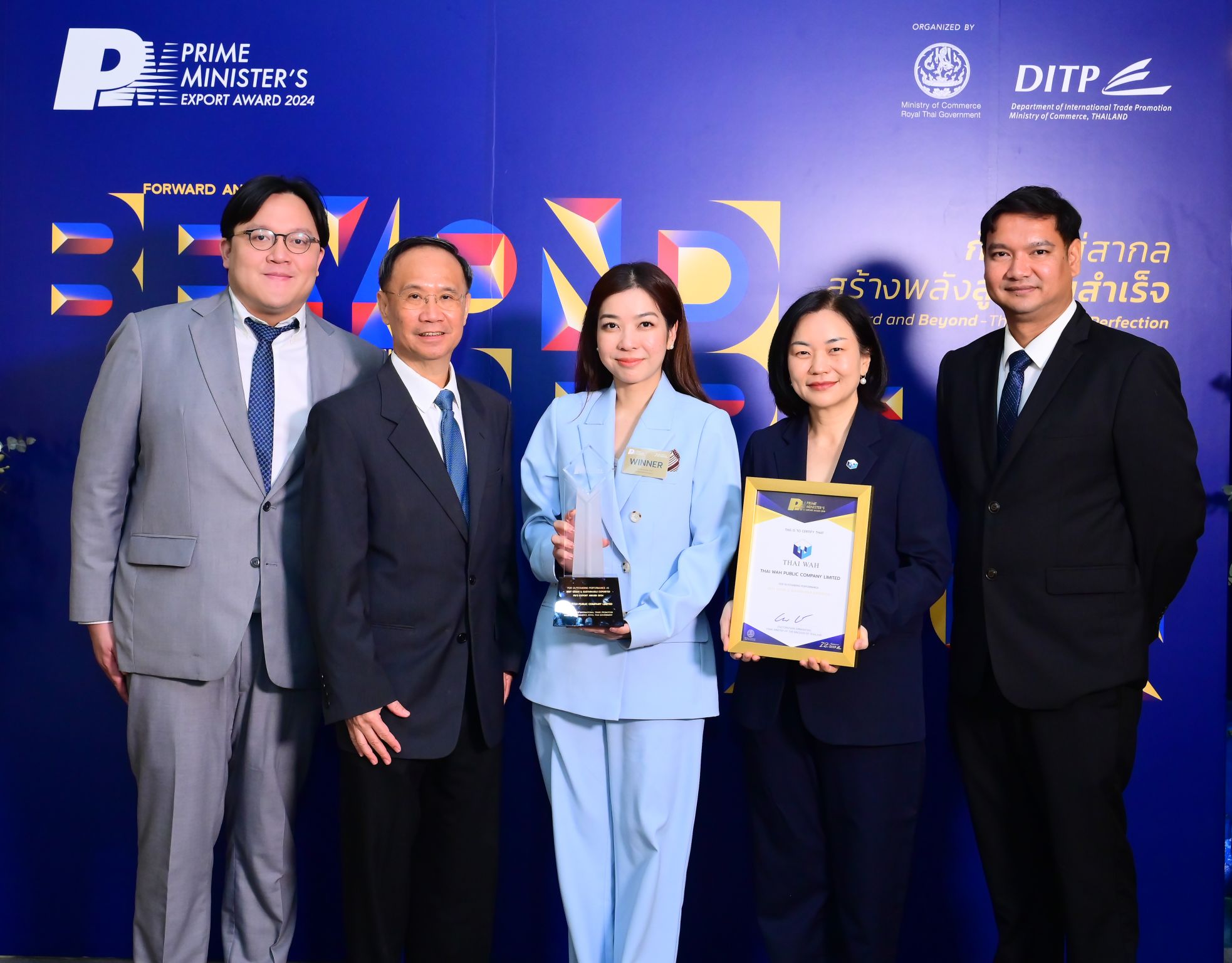Earlier this week we revisited one of two Cleantech Forum Asia 2024 sessions on agri-food innovation, in anticipation of the event’s return to Singapore next week.
The second of those sessions was a fireside chat with Hataikan Kamolsirisakul, Head of Strategy, Sustainability and Innovation, and New Business at Thai Wah Group.
Headquartered in Bangkok, Thailand, Thai Wah is one of the world’s largest manufacturers of edible starches and noodles. It has factories across Southeast Asia and works directly with over 50,000 farmers. Speaking at last year’s Cleantech Forum Asia, Hataikan shared how the company is turning to technology and business model innovation to tackle the region’s climate challenges.

Thai Wah recently won the Prime Minster of Thailand’s Export Award for Best Green & Sustainable Exporter (Hataikan Kamolsirisakul, middle)
30% Yield Decreases Due to Drought, Disease
Thai Wah sources over 1.3 million tons of crops annually; primarily cassava, mung bean, and rice, which it processes into commercial starches and noodles. But with each passing year, the climate constraints being placed on this supply chain are becoming increasingly obvious.
“In the last two years we’ve seen almost a 30% yield decrease for tapioca [cassava] farmers across Cambodia, Vietnam, and Thailand,” Hataikan said. “The primary factor was drought, and the second order of impact has been a rise in crop diseases.”
While Thai Wah has made substantial investment into crop breeding and genetics work to improve resilience, it has also begun to explore other possibilities.
“We’re moving into what we call ‘soil innovation’; soil health, soil biology,” she said. This has included development of biological inputs that can improve crop nutrition while also providing resistance to environmental stressors, and without the negative impacts associated with chemical inputs.
These biofertilizers and biostimulants can be produced using sidestreams from Thai Wah’s core business, such as agricultural residues and waste: another key area of focus for Hataikan and her team. The company creates 500,000 tons of waste annually, she explained.
“If we can upcycle that waste into bioplastics, cattle feed, or energy, that’s a huge opportunity.”
Putting Farmers Front and Center
The vast majority of farmers that Thai Wah works with are smallholders, cultivating crops on just a couple of hectares of land. These farmers operate on extremely thin margins, and an adverse climate, disease, or pest event could essentially wipe out their family’s income for an entire season.
Convincing smallholders to take the risk of changing their ingrained approaches to farming by introducing novel inputs or other innovations is no small task.
Thai Wah collected feedback directly from its farmer partners and used the insights it gained to ‘de-risk’ its biological inputs for them. This involved tailoring the products to specific requirements, while providing local workshops to disseminate best practices for their use.
“We heard over 33,000 individual pain points from farmers,” Hataikan said. “And most of it wasn’t about yield or crops. It was about family health, education for their children, financial security, safety. These farmers have been doing the same thing for two or three generations. They’ve been using chemical fertilizer for 30, 40 years. You can’t just tell them to switch and wait nine months for results,” she added.
“Our biofertilizer product today can help them save 5 — 10% on chemical fertilizer costs by replacing about 50% of the chemicals they use.”
Carbon Market Potential
Thai Wah is also exploring opportunities to unlock value through carbon markets, though Hataikan voiced caution regarding barriers to smallholder participation.
“We’re working with a few consultants and with the Thai government to try to get to baselining and measure what we can decarbonize,” she said. “But today, if you want a carbon project done with a smallholder, it’s still too complex and expensive.”
Over the longer-term Thai Wah is exploring the use of carbon credits and other climate finance mechanisms as part of its broader objective of reducing emissions while directing value back to farmers.
“Our goal is to build platforms that can benefit a million farmers by 2030,” Hataikan said.
Tapping Corporate Venture Capital
To reach that target, Thai Wah has recognized the need to engage with external innovators, while continuing its own internal R&D efforts.
“The goal is not to innovate for the sake of innovating, but to find something that can scale across Southeast Asia, and maybe the world,” Hataikan said.
In late 2021 the company launched a corporate VC arm, Thai Wah Ventures, to invest in tech start-ups working on agri-food and supply chain solutions.
Thai Wah Ventures focuses on four main themes:
- Agricultural and soil science deeptech
- Digital supply chain solutions
- Waste upcycling, with a focus on bioplastics production
- Novel functional food ingredients
Portfolio companies include:
- Agrizy (India): A digital platform connecting farmers with industrial buyers
- altM (India): Developing sustainable materials from agricultural waste
- Great Wrap (Australia): Producing compostable packaging film from food waste
Common to all these companies, and others that Thai Wah may invest in or work with in the future, is a recognition that simplicity is required for real-world success in agri-food ecosystems.
“If you really want to scale anything with smallholder farmers, it has to be simple, it has to be practical, and it has to make sense from day one,” Hataikan said.
By pursuing both internal and external innovation strategies and leveraging its relationships with farmers, Thai Wah is crafting a new model for climate resilience: one that puts smallholders and their communities at the center of Southeast Asia’s food security and sustainability.


